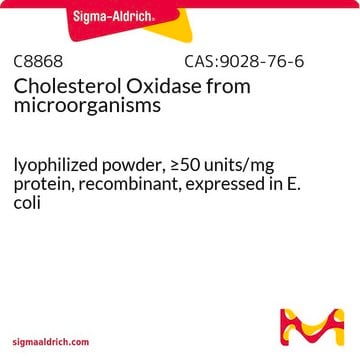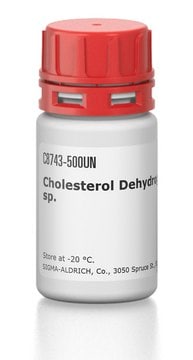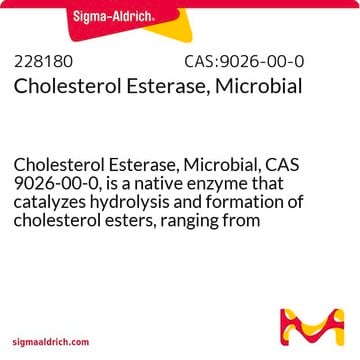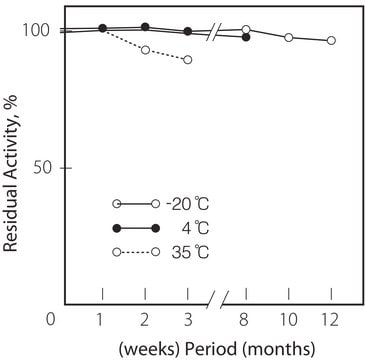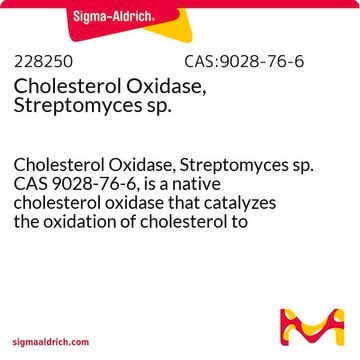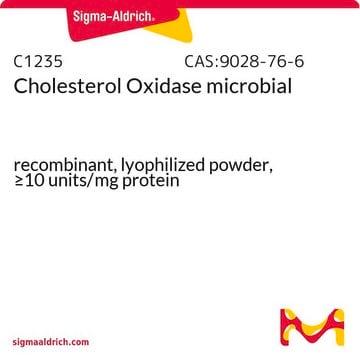C5421
Cholesterol Oxidase from microorganisms
aqueous solution, ≥30 units/mg protein (biuret)
Synonim(y):
Cholesterol:oxygen oxidoreductase
Zaloguj sięWyświetlanie cen organizacyjnych i kontraktowych
About This Item
Polecane produkty
Postać
aqueous solution
aktywność właściwa
≥30 units/mg protein (biuret)
masa cząsteczkowa
62 kDa
rozpuszczalność
50 mM potassium phosphate buffer, pH 7.0: soluble (Cold)
Warunki transportu
dry ice
temp. przechowywania
−70°C
Zastosowanie
Cholesterol oxidase has been used in a study to improve treatment of oxysterol-mediated cytotoxicity. Cholesterol oxidase has also been used in a study that determined that cholesterol depletion impairs coupling between channel opening and vesicle release by allowing voltage-gated calcium channels to move further from release sites.
Cholesterol oxidase has been used in a study to improve treatment of oxysterol-mediated cytotoxicity. Cholesterol oxidase has also been used in a study that evaluated the effects of cholesterol depletion. This study reported that cholesterol depletion impairs the coupling between channel opening and vesicle release. Additionally, cholesterol oxidase is used to determine serum cholesterol levels. The enzyme also finds application in the microanalysis of steroids in food samples. It has also been used for distinguishing 3-ketosteroids from 3β-hydroxysteroids. Transgenic plants expressing cholesterol oxidase have been investigated in the fight against the cotton boll weevil. CHOD has also been used as a molecular probe to elucidate cellular membrane structures.
Działania biochem./fizjol.
Cholesterol oxidase (CHOD) is a monomeric flavoprotein containing FAD that catalyzes the first step in cholesterol catabolism. This bifunctional enzyme oxidizes cholesterol to cholest-5-en-3-one in an FAD-requiring step. The pH optimum of the enzyme is 7.0 to 7.5 and temperature optimum is 50 °C. The pH stability is 5.7-7.8. Hg2+, Ag+, and ionic detergents inhibit the enzyme activity. Molecular mass of the enzyme is 62 kDa. Pathogenic bacteria require CHOD to infect a host′s macrophage.
Definicja jednostki
One unit will convert 1.0 μmole of cholesterol to 4-cholesten-3-one per min at pH 7.5 at 25 °C. Note: 4-cholesten-3-one may undergo isomerization.
Uwaga dotycząca przygotowania
CHOD is soluble in cold 50 mM potassium phosphate buffer, pH 7.0. Prepare solutions immediately before use.
This page may contain text that has been machine translated.
Hasło ostrzegawcze
Danger
Zwroty wskazujące rodzaj zagrożenia
Zwroty wskazujące środki ostrożności
Klasyfikacja zagrożeń
Resp. Sens. 1
Kod klasy składowania
11 - Combustible Solids
Klasa zagrożenia wodnego (WGK)
WGK 3
Temperatura zapłonu (°F)
Not applicable
Temperatura zapłonu (°C)
Not applicable
Środki ochrony indywidualnej
Eyeshields, Gloves, type N95 (US)
Certyfikaty analizy (CoA)
Poszukaj Certyfikaty analizy (CoA), wpisując numer partii/serii produktów. Numery serii i partii można znaleźć na etykiecie produktu po słowach „seria” lub „partia”.
Masz już ten produkt?
Dokumenty związane z niedawno zakupionymi produktami zostały zamieszczone w Bibliotece dokumentów.
Ruchi Chaube et al.
Biochimica et biophysica acta, 1821(2), 313-323 (2011-11-09)
Chronic exposure of blood vessels to cardiovascular risk factors such as free fatty acids, LDL-cholesterol, homocysteine and hyperglycemia can give rise to endothelial dysfunction, partially due to decreased synthesis and bioavailability of nitric oxide (NO). Many of these same risk
Laura Caldinelli et al.
The Journal of biological chemistry, 280(24), 22572-22581 (2005-04-09)
Cholesterol oxidase from Brevibacterium sterolicum is a monomeric flavoenzyme catalyzing the oxidation and isomerization of cholesterol to cholest-4-en-3-one. This protein is a class II cholesterol oxidases, with the FAD cofactor covalently linked to the enzyme through the His(69) residue. In
Porntip H Lolekha et al.
Clinica chimica acta; international journal of clinical chemistry, 339(1-2), 135-145 (2003-12-23)
Cholesterol oxidase is used for the determination of serum cholesterol. It can be derived from Streptomyces, Pseudomonas fluorescens, Cellulomonas, and Brevibacterium. This study compared the performance characteristics of four enzymes in the endpoint cholesterol determination. Using the Mega analyzer, we
Charlotte Ford et al.
PLoS pathogens, 14(5), e1007051-e1007051 (2018-05-05)
Pathogens hijack host endocytic pathways to force their own entry into eukaryotic target cells. Many bacteria either exploit receptor-mediated zippering or inject virulence proteins directly to trigger membrane reorganisation and cytoskeletal rearrangements. By contrast, extracellular C. trachomatis elementary bodies (EBs)
Yan Sun et al.
Biotechnology letters, 33(10), 2049-2055 (2011-06-28)
Site-directed mutagenesis was applied to enhance the thermostability and enzymatic activity of cholesterol oxidase (ChOx) isolated from Brevibacterium sp. Three amino acid residues (Q153E, F128L, and S143H) located near the FAD-binding site of the enzyme were substituted based on structural
Nasz zespół naukowców ma doświadczenie we wszystkich obszarach badań, w tym w naukach przyrodniczych, materiałoznawstwie, syntezie chemicznej, chromatografii, analityce i wielu innych dziedzinach.
Skontaktuj się z zespołem ds. pomocy technicznej